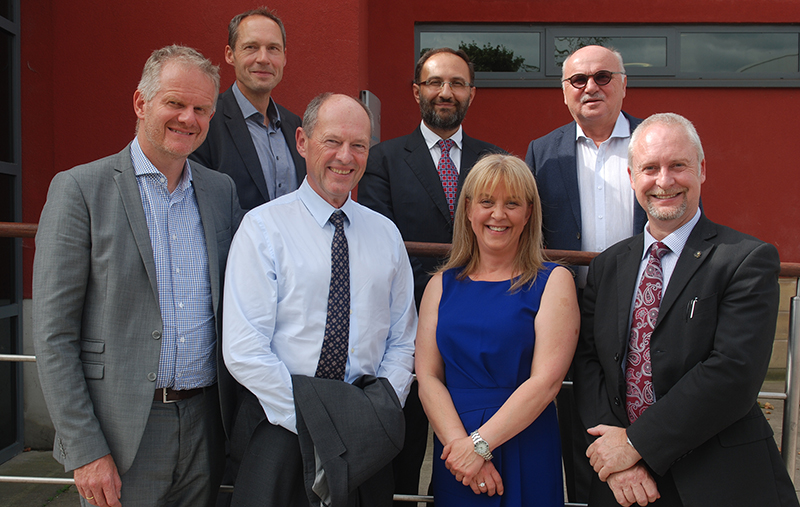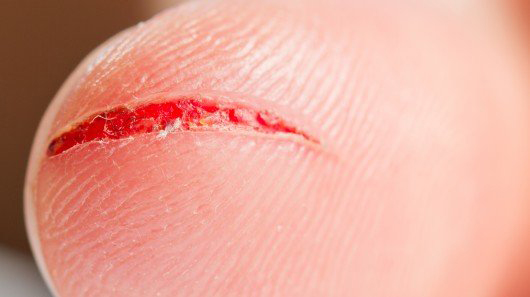Austrian medical university forges links with Skin researchers
 Delegates from the Paracelsus Medical University are pictured with Huddersfield's Professor Karen Ousey, Professor Andrew Ball (far right) and Professor Ojan Assadian (centre rear)
Delegates from the Paracelsus Medical University are pictured with Huddersfield's Professor Karen Ousey, Professor Andrew Ball (far right) and Professor Ojan Assadian (centre rear)
Tue, 13 Sep 2016 15:52:00 BST
Paracelsus Medical University will work closely with the University’s Institute of Skin Integrity and Infection Prevention on research and staff and student exchanges
 A RESEARCH group at the University of Huddersfield is poised to form a partnership with a major German medical institution. It is hoped that this will lead to breakthroughs in fields such as wound care and infection prevention. Also, the agreement could be a model for post-Brexit collaboration between British and European universities.
A RESEARCH group at the University of Huddersfield is poised to form a partnership with a major German medical institution. It is hoped that this will lead to breakthroughs in fields such as wound care and infection prevention. Also, the agreement could be a model for post-Brexit collaboration between British and European universities.
Huddersfield is home to the Institute of Skin Integrity and Infection Prevention (ISIaIP), a multi-disciplinary team headed by Professor Karen Ousey. Members include Professor Ojan Assadian who is also in the process of being appointed to a key post at the Paracelsus Medical University (PMU), based in Nuremberg. This has one of the largest microbiology and infectious disease departments in Germany and is attached to a 3,700 bed university teaching hospital.
Austrian-born Professor Assadian will take over as Director of PMU’s Institute of Clinical Microbiology, Infectious Diseases and Hygiene, but he will retain his affiliation with the University of Huddersfield’s ISIaIP. He is therefore a link between the two universities as they move towards a formal agreement that will lead to research collaborations and staff-student exchanges.
Two senior figures at Paracelsus Medical University have paid a visit to Huddersfield. They were its Medical Director Professor Günter Niklewski and its Vice Dean, Professor Wolfgang Söllner. They held talks with a group that included Professor Ousey and Professor Assadian, plus the University of Huddersfield’s Pro Vice-Chancellor for Research and Enterprise, Professor Andrew Ball and Professor Liz Towns-Andrews, who is Director of Research and Enterprise.
 Professor Assadian expects that exchanges between medical and nursing students plus research collaboration in fields such as wound care technology would be among the outcomes of the collaboration. He explained that PMU is a purely medical institution, meaning it can benefit from the multi-disciplinary nature of Huddersfield’s Institute of Skin Integrity and Infection Prevention, whose members have expertise in a wide variety of medical, scientific, design and technical fields, including the development of engineering solutions to clinical problems.
Professor Assadian expects that exchanges between medical and nursing students plus research collaboration in fields such as wound care technology would be among the outcomes of the collaboration. He explained that PMU is a purely medical institution, meaning it can benefit from the multi-disciplinary nature of Huddersfield’s Institute of Skin Integrity and Infection Prevention, whose members have expertise in a wide variety of medical, scientific, design and technical fields, including the development of engineering solutions to clinical problems.
It is also intended that the two universities will make joint application for major collaborative research grants. The prospect of Brexit is viewed with concern by UK universities, in case it shuts down opportunities for European collaboration, but there could also be opportunities, argues Professor Assadian. For example, it is standard procedure for EU universities, when forming consortia to seek research funding, to include an institution from a non-EU country.
“Traditionally, these projects were approached by a consortium of two European academic institutions and one from Israel or Switzerland, for example, but now we believe that a UK university could be a very attractive partner for research institutions in mainland Europe,” said Professor Assadian.







